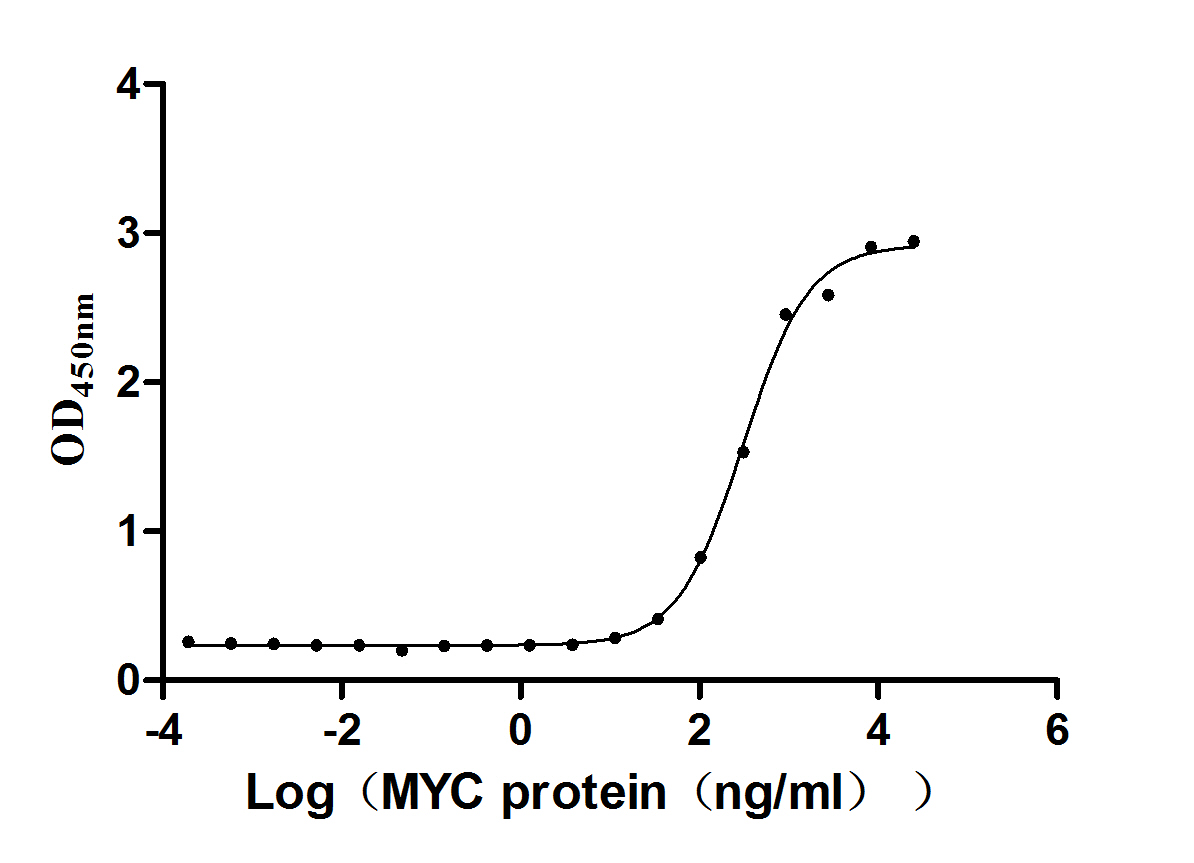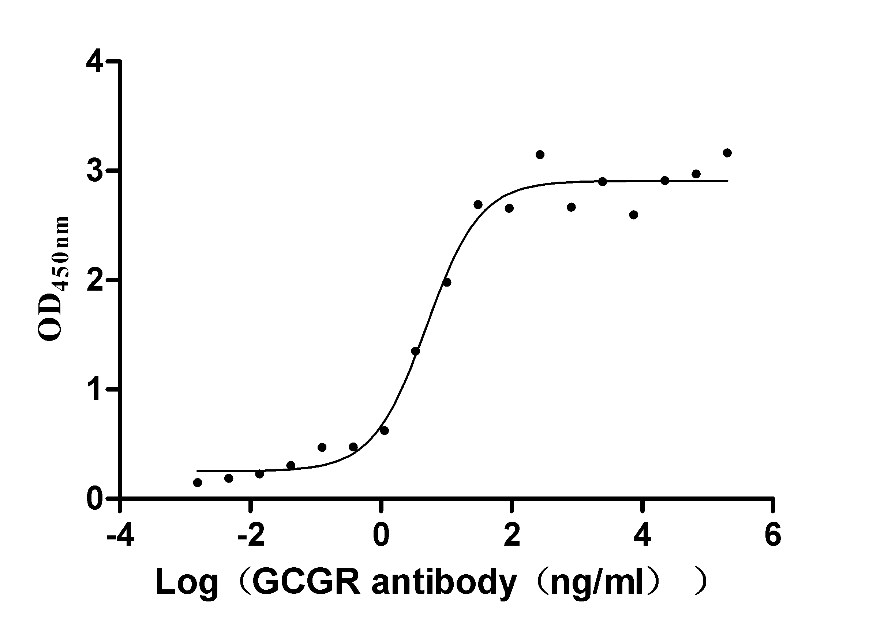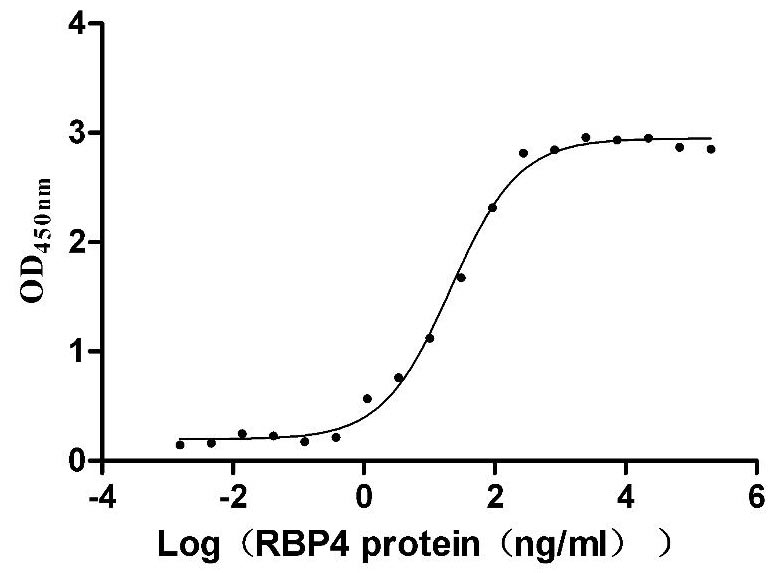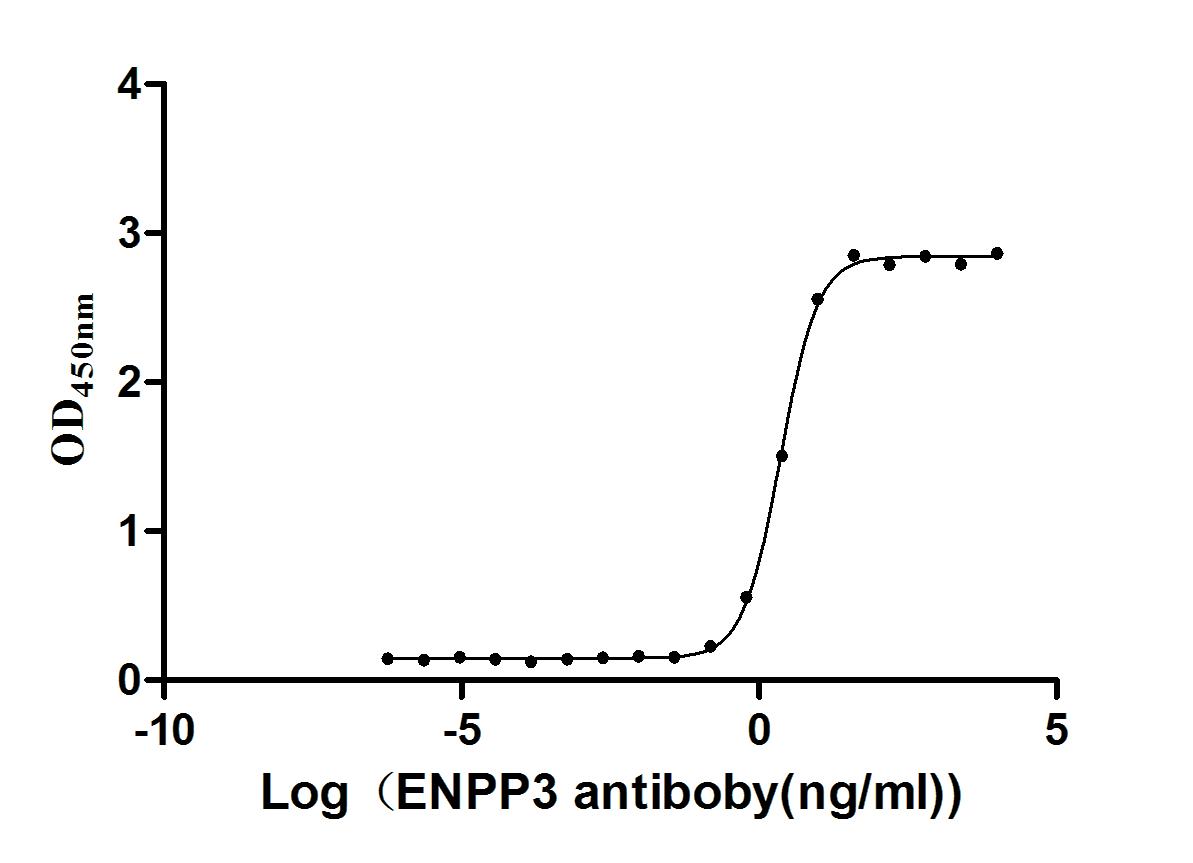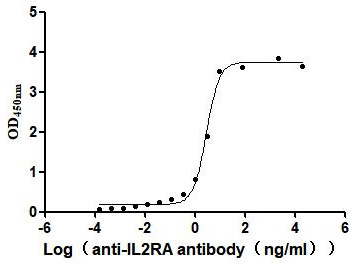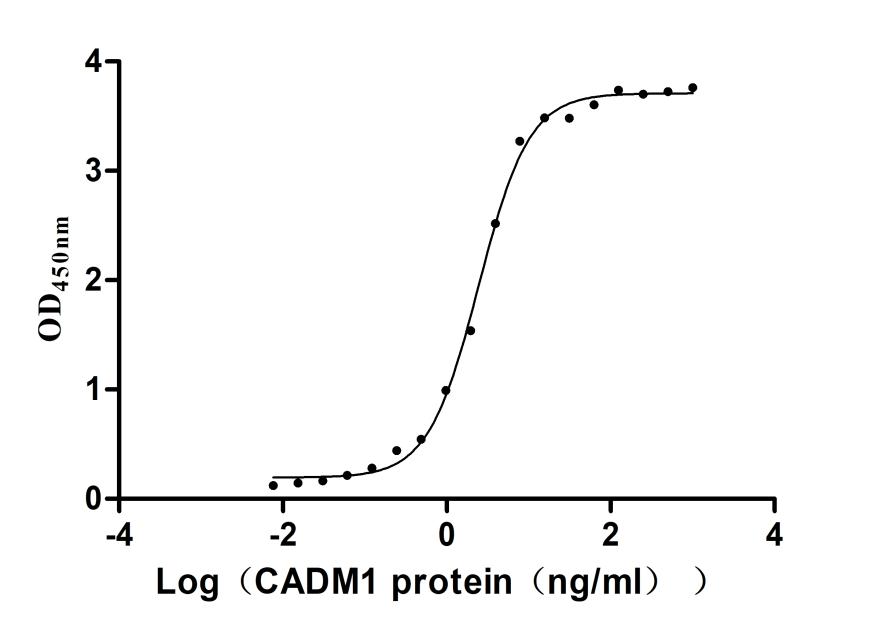Recombinant Mouse Suppressor of cytokine signaling 3 (Socs3)
-
货号:CSB-YP022392MO
-
规格:
-
来源:Yeast
-
其他:
-
货号:CSB-EP022392MO
-
规格:
-
来源:E.coli
-
其他:
-
货号:CSB-EP022392MO-B
-
规格:
-
来源:E.coli
-
共轭:Avi-tag Biotinylated
E. coli biotin ligase (BirA) is highly specific in covalently attaching biotin to the 15 amino acid AviTag peptide. This recombinant protein was biotinylated in vivo by AviTag-BirA technology, which method is BriA catalyzes amide linkage between the biotin and the specific lysine of the AviTag.
-
其他:
-
货号:CSB-BP022392MO
-
规格:
-
来源:Baculovirus
-
其他:
-
货号:CSB-MP022392MO
-
规格:
-
来源:Mammalian cell
-
其他:
产品详情
-
纯度:>85% (SDS-PAGE)
-
基因名:
-
Uniprot No.:
-
别名:Socs3; Cis3; Cish3; Suppressor of cytokine signaling 3; SOCS-3; Cytokine-inducible SH2 protein 3; CIS-3; Protein EF-10
-
种属:Mus musculus (Mouse)
-
蛋白长度:Full length protein
-
表达区域:1-225
-
氨基酸序列MVTHSKFPAA GMSRPLDTSL RLKTFSSKSE YQLVVNAVRK LQESGFYWSA VTGGEANLLL SAEPAGTFLI RDSSDQRHFF TLSVKTQSGT KNLRIQCEGG SFSLQSDPRS TQPVPRFDCV LKLVHHYMPP PGTPSFSLPP TEPSSEVPEQ PPAQALPGST PKRAYYIYSG GEKIPLVLSR PLSSNVATLQ HLCRKTVNGH LDSYEKVTQL PGPIREFLDQ YDAPL
-
蛋白标签:Tag type will be determined during the manufacturing process.
The tag type will be determined during production process. If you have specified tag type, please tell us and we will develop the specified tag preferentially. -
产品提供形式:Lyophilized powder
Note: We will preferentially ship the format that we have in stock, however, if you have any special requirement for the format, please remark your requirement when placing the order, we will prepare according to your demand. -
复溶:We recommend that this vial be briefly centrifuged prior to opening to bring the contents to the bottom. Please reconstitute protein in deionized sterile water to a concentration of 0.1-1.0 mg/mL.We recommend to add 5-50% of glycerol (final concentration) and aliquot for long-term storage at -20℃/-80℃. Our default final concentration of glycerol is 50%. Customers could use it as reference.
-
储存条件:Store at -20°C/-80°C upon receipt, aliquoting is necessary for mutiple use. Avoid repeated freeze-thaw cycles.
-
保质期:The shelf life is related to many factors, storage state, buffer ingredients, storage temperature and the stability of the protein itself.
Generally, the shelf life of liquid form is 6 months at -20°C/-80°C. The shelf life of lyophilized form is 12 months at -20°C/-80°C. -
货期:Delivery time may differ from different purchasing way or location, please kindly consult your local distributors for specific delivery time.Note: All of our proteins are default shipped with normal blue ice packs, if you request to ship with dry ice, please communicate with us in advance and extra fees will be charged.
-
注意事项:Repeated freezing and thawing is not recommended. Store working aliquots at 4°C for up to one week.
-
Datasheet :Please contact us to get it.
靶点详情
-
功能:SOCS family proteins form part of a classical negative feedback system that regulates cytokine signal transduction. SOCS3 is involved in negative regulation of cytokines that signal through the JAK/STAT pathway. Inhibits cytokine signal transduction by binding to tyrosine kinase receptors including IL6ST/gp130, LIF, erythropoietin, insulin, IL12, GCSF and leptin receptors. Binding to JAK2 inhibits its kinase activity and regulates IL6 signaling. Suppresses fetal liver erythropoiesis. Regulates onset and maintenance of allergic responses mediated by T-helper type 2 cells. Probable substrate recognition component of a SCF-like ECS (Elongin BC-CUL2/5-SOCS-box protein) E3 ubiquitin-protein ligase complex which mediates the ubiquitination and subsequent proteasomal degradation of target proteins.
-
基因功能参考文献:
- SOCS3 impacts on IEC turnover following T. muris infection, potentially through enhancement of IDO. IDO may dampen the immune response which can drive intestinal epithelial cell hyperproliferation in the absence of SOCS3, demonstrating the intricate interplay of immune signals regulating mucosal homeostasis, and suggesting a novel tumour suppressor role of SOCS3. PMID: 28508554
- The findings of this indicated that co-deletion of PTEN and SOCS3 results in modest but measureable enhancement of early regeneration of DRG axons following crush injury. PMID: 29458059
- Our findings suggest a role for murine cytomegalovirus (MCMV)-related stimulation of SOCS1 and SOCS3 in the progression of retinal disease during ocular, but not systemic, MCMV infection. PMID: 29976680
- Lentivirusmediated overexpression of SOCS3 was revealed to ameliorate neutrophilic airway inflammation by inhibiting pulmonary Th17 responses in mice with chronic Pseudomonas aeruginosa lung infections. PMID: 29393363
- These data demonstrate that loss of SOCS3 in cardiomyocytes promotes deoxycorticosterone-acetate -salt-induced cardiac remodeling and inflammation. PMID: 29763909
- In the present study, we investigated the hypothesis that SOCS3 expression in the VMH could exert an important role regulating the metabolic changes typically observed during pregnancy and lactation. PMID: 28987511
- SOCS3 was targeted by miR30a- 5p in allergic rhinitis PMID: 29471302
- SOCS3 was upregulated in lung CD4+ T cells in a mouse model of chronic PA lung infection and exogenous SOCS3 suppressed Th17-mediated neutrophil recruitment in vitro. PMID: 28560450
- findings show SOCS3 does not appear to mediate the early inflammatory or leucine-induced changes in protein synthesis in skeletal muscle PMID: 28554144
- The strength of long bones is determined by coalescence of trabeculae during corticalization.This process is regulated by SOCS3 via a mechanism dependent on IL-6 and expression of sex hormones. PMID: 28993616
- High SOCS3 expression is associated with glioma. PMID: 26967393
- Mechanistic analysis indicated that E47 activated expression of the transcription factor Spi-B and the suppressor of cytokine signaling 3 (SOCS3), which both downregulated Foxp3 expression. These findings demonstrate that the balance of Id3 and E47 controls the maintenance of Foxp3 expression in Treg cells and, thus, contributes to Treg cell plasticity. PMID: 27974197
- Our results show, for the first time, that SOCS-3 regulates leptin-induced responses in cartilage PMID: 27716333
- Loss of suppressor of cytokine (SOCS3) expression in mature muscle fibers increased the inflammatory response to myotoxic injury but did not impair muscle regeneration in either adult or old mice. Therefore, reduced SOCS3 expression in muscle fibers is unlikely to underlie impaired muscle regeneration. PMID: 27800152
- Findings revealed a novel participation of SOCS3 regulating several endocrine and metabolic aspects. PMID: 28899903
- Findings indicate that inactivation of the Rb family proteins (Rb, p107, and p130) in hematopoietic stem cells (HSCs) progressively impairs their homeostasis, which is rescued upon repression of suppressor of cytokine signaling 3 protein (Socs3) expression in triple knockout (TKO) HSCs. PMID: 28550162
- Data suggest that, in B cell lymphoma, expression of MIRN30 is up-regulated in both granulocytic myeloid-derived suppressor cells and monocytic myeloid-derived suppressor cells; in B cell lymphoma, 3prime untranslated region of Socs3 appears to be direct target of MIRN30 in myeloid-derived suppressor cell differentiation. (MIRN30 = microRNA 30; Socs3 = suppressor of cytokine signaling 3 protein) PMID: 28605567
- Cell type-specific, different roles for viral immediate early or early gene expression and/or viral tegument proteins in the early stimulation of SOCS1 and SOCS3 during murine cytomegalovirus infection. PMID: 28182772
- oncostatin M mitigated the proliferation of Th17 cells and decreased the expression of IL-17 and IL-21; it promoted the activation of suppressor of cytokine signaling 3 (SOCS3), STAT3, and STAT5; observations suggest that OSM can inhibit Th17 differentiation by reciprocally controlling SOCS3, STAT3, and STAT5 PMID: 28093521
- Results demonstrate a novel tunable form of cross-talk in which alveolar epithelial cells use Prostaglandin E2 (PGE2) as a signal to request SOCS3 from alveolar macrophages to dampen their endogenous inflammatory responses during infection. PMID: 27183597
- Loss of SOCS3 significantly accelerated the pathology and inflammatory disease characteristic of SOCS1 deficiency. We propose a model in which SOCS1 and SOCS3 operate independently to control specific cytokine responses and together modulate the proliferation and activation of lymphoid and myeloid cells to prevent rapid inflammatory disease PMID: 27583437
- This study showed that leptin resistant infertility is caused in part by the leptin signaling molecule SOCS3. Deletion of SOCS3 from brain neurons delays the onset of diet-induced infertility. PMID: 27383590
- SOCS3 plays a divergent role in relation to local vs. systemic effects of Ang II on the vasculature. PMID: 27106041
- These results indicate that Platelet-activating Factor -mediated endotoxin tolerance is initiated via IDO- and JAK/STAT-dependent expression of SOCS3. PMID: 28077574
- critical negative regulator of alveolar bone loss in experimental periodontitis PMID: 27126447
- expression in leptin receptor-positive cells contributes to fasting-induced hyperphagia and weight regain PMID: 27471877
- a novel negative feedback loop mediated by STAT3-SOCS3, which is tightly controlled by SENP1 via de-SUMOylation of protein tyrosine phosphatase 1B (PTP1B), in IFN-gamma signaling, is reported. PMID: 27702761
- Vasoproliferative retinopathies may benefit from a CNTF-dependent and SOCS3-mediated angiomodulatory effect. PMID: 27494343
- this study shows that fungal pattern receptors share with other ITAM-coupled receptors the capacity to produce cross-inhibition through a mechanism involving STAT3 and induction of SOCS3 and IL-10, but that cannot be explained through type I IFN signaling PMID: 27709605
- this study shows that suppression of IL-6/Stat3 pathway in dendritic cells by paeoniflorin is mediated via upregulation of Socs3 PMID: 27236299
- Study indicated that SOCS3 suppresses complete polarization to M1 phenotype through blocking IL6 production, and Abeta-challenged primary-cultured microglia replicate the in vivo gene expression pattern of microglia in APPswe/PS1dE9 mice PMID: 27814300
- Results identify unrecognized functions of Yes-associated protein (YAP) in preventing reactive astrogliosis and reveal a pathway of YAP- suppressor of cytokine signaling 3 (SOCS) for the negatively control of neuroinflammation. PMID: 26679195
- SOCS3 serves as an immune modulator interfering with T cells and B cells, and SOCS3 may act as a predictive marker for immune modulation of mesenchymal stromal cells. PMID: 26318865
- Signal transducer and activator of transcription 3 and suppressor of cytokine signaling 3 play important, yet unexpected, roles in NG2 cell proliferation and differentiation after spinal cord injury. PMID: 26804026
- The results of this study showed that the role of SOCS3 in mediating pregnancy-induced metabolic adaptations. PMID: 26828039
- Concentration of SOCS-3 protein and coimmunoprecipitation of SOCS-3 protein with both the IR-beta subunit as well as IRS-1 was found to be decreased by 4-HIL PMID: 26887316
- CCR5 blockade suppresses B16 melanoma growth by inhibiting of IL-6-Stat3 signaling pathway via upregulation of SOCS3. PMID: 26047948
- AHR plays protective roles against high-fat diet-induced hepatic steatosis and the subsequent lipotoxicity via direct transcriptional regulation of Socs3 gene expression. PMID: 26865635
- The liver regenerative effects of HCM appear to be mediated by persistent and uninhibited expression of STAT3 in the liver, which results from decreased expression of SOCS3 PMID: 27102647
- SOCS3 gene expression attenuates contact hypersensitivity by suppressing MMP12 production. PMID: 27015453
- These results suggest that neuronal and glial cell SOCS3 limits pathological retinal angiogenesis by suppressing VEGF signaling. PMID: 26396267
- Socs3 deletion in cortical neurons promotes sprouting of corticospinal axons after unilateral pyramidotomy, restoring skilled locomotion. PMID: 26598325
- sleep deprivation increases levels in hematopoietic stem cells PMID: 26465715
- SOCS3-deficient and sufficient B-lineage cell migration towards CXCL12 in vitro was undistinguishable, and B-lineage cell amoeboid motility within BM parenchyma was also unaffected by SOCS3-deficiency PMID: 26274929
- RORalpha regulates pathologic retinal angiogenesis by modulating SOCS3-dependent inflammation PMID: 26243880
- findings suggest that SOCS3 may represent a key factor that exacerbates the development of myocardial IRI. PMID: 26010537
- The critical function of SOCS3 is as a negative regulator of MDSC development and function via inhibition of STAT3 activation. PMID: 25649351
- mediates inhibition of TH17 cell differentiation by mesenchymal stem cells PMID: 25588866
- SOCS3 is an inducible host factor that regulates virus egress during Ebola virus infection. PMID: 26246577
- SOCS3 deficiency greatly alleviates IgG immune complex-induced generation of pro-inflammatory mediators in lungs. PMID: 26209606
显示更多
收起更多
-
组织特异性:Low expression in lung, spleen and thymus. Expressed in Th2 but not TH1 cells.
-
数据库链接:
KEGG: mmu:12702
STRING: 10090.ENSMUSP00000059129
UniGene: Mm.3468
Most popular with customers
-
Recombinant Human Glypican-3 (GPC3) (G537R), partial (Active)
Express system: Mammalian cell
Species: Homo sapiens (Human)
-
Recombinant Human Tumor necrosis factor ligand superfamily member 8 (TNFSF8), partial (Active)
Express system: Mammalian cell
Species: Homo sapiens (Human)
-
Recombinant Human papillomavirus type 16 Protein E7 (E7) (Active)
Express system: E.coli
Species: Human papillomavirus type 16
-
Recombinant Human Glucagon receptor (GCGR), partial (Active)
Express system: Mammalian cell
Species: Homo sapiens (Human)
-
Recombinant Mouse Transthyretin (Ttr) (Active)
Express system: Mammalian cell
Species: Mus musculus (Mouse)
-
Express system: Mammalian cell
Species: Homo sapiens (Human)
-
Recombinant Human Interleukin-2 receptor subunit alpha (IL2RA), partial (Active)
Express system: Mammalian cell
Species: Homo sapiens (Human)
-
Recombinant Human Cytotoxic and regulatory T-cell molecule (CRTAM), partial (Active)
Express system: Mammalian cell
Species: Homo sapiens (Human)


-AC1.jpg)

